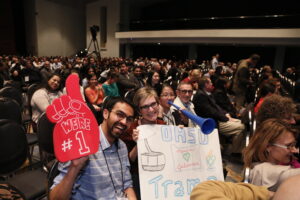In the preliminary and semifinal rounds, only fellows compete. In the preliminary round, other teams—usually three at a time—compete in a single-elimination tournament, with each round consisting of one 25-question board, to identify the three teams that go on to the semifinals.
In the semifinals, the top three teams from the preliminary round compete against one another through two 25-question boards, and the top two scorers move on to the finals, where they compete against the reigning champs.
The final event has four parts: three game boards followed by a final round. In the first and third game boards, only fellows compete. In the second round, the attending member of the team joins the fellows, and the points for this game board are doubled. The attending again joins the fellows for the final round, in which each team can wager some or all of their points on the last and most difficult question of the competition.
Have a cheering section. Besides your team of two fellows and an attending, it’s important to have your bigger team of colleagues supporting you in the audience. There’s a separate award under consideration for the team that displays the best team spirit. This has been won in the past with foam fingers and vuvuzelas, or the tossing of Mardi Gras beads. Teams have received support in the form of posters, colleagues dressed as luchadores, inventive cheers and dances.
Hone your buzzer strategy. One thing engenders great anxiety and frustration in Knowledge Bowl contestants: the dreaded buzzer. In recent years, the buzzer used during the Knowledge Bowl has changed between various online platforms and physical buttons, each with its own set of quirks. For many questions, multiple teams may know the answer, so proficiency with the buzzer is key to claiming the title. This is the one aspect of the tournament for which little preparation can be done in advance.

Jean Liew, as a resident, cheers on the Oregon Health & Science University team (Tramadolls, 2016) with a vuvuzela. Her fellows in the cheering section are holding a foam finger and a poster. (Click to enlarge.)
So how does a team set themselves up for success with the buzzer? The secret here lies just before the tournament begins. Prior to the tournament, all teams gather in the auditorium to go over the rules and test the buzzer system to ensure there are no glitches using a sample question board. This is your greatest opportunity to understand the buzzer and strategize accordingly. Does the buzzer become active as soon as the question is displayed, or is there a delay? If so, is the delay long enough that your finger will tire out if you start hitting the buzzer too early? Does the buzzer lock you out if you press before it becomes active? If it is on a touchscreen device, are you able to zoom in to increase the size of the buzzer? The better you understand the buzzer, the more likely you will be to use it to your advantage.


